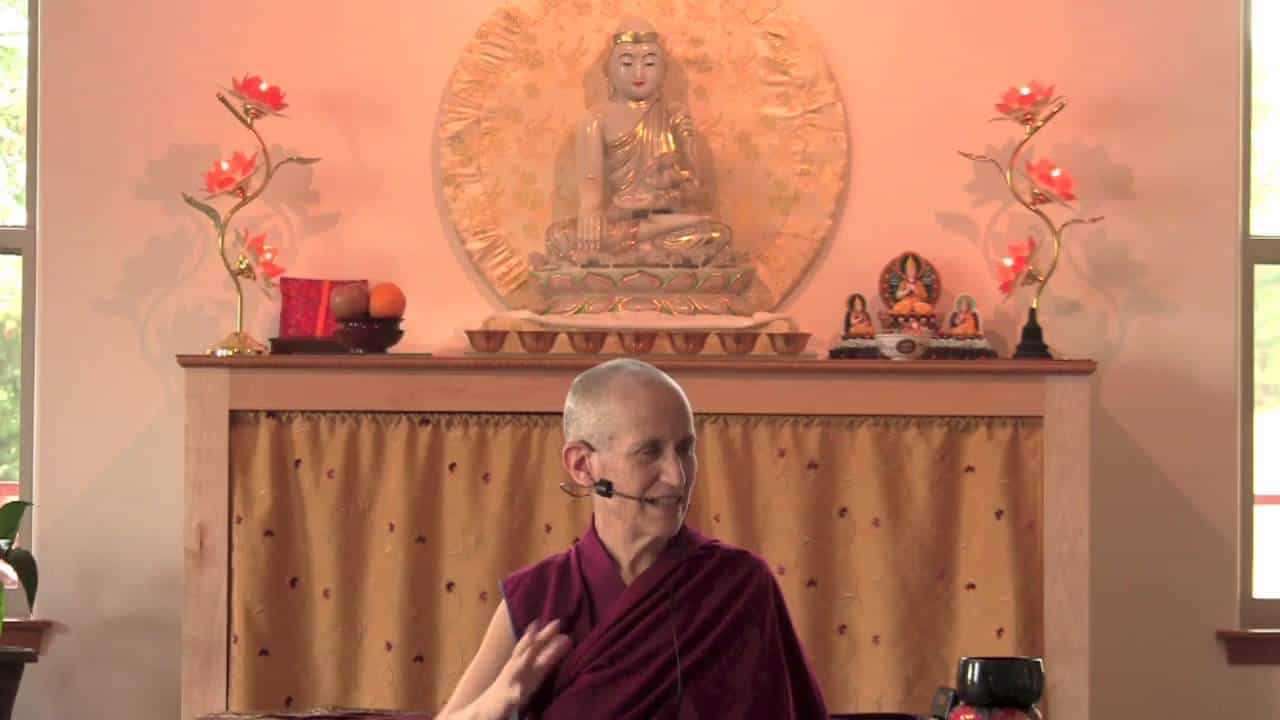Overcoming confusion
Overcoming confusion
Part of a series of teachings on the text The Essence of a Human Life: Words of Advice for Lay Practitioners by Je Rinpoche (Lama Tsongkhapa).
- How studying the text can give us clarity in our daily lives
- Teachings on the initial scope
- Precious human life
- Impermanence and death
- Really thinking about what’s important, what is going to be of benefit, in our lives
The Essence of a Human Life: Overcoming confusion (download)
Right before I left on the trip we finished the Gems of Wisdom, so now we’re going to start another text, and some of my Russian friends suggested this one. It’s a text by Je Rinpoche (Lama Tsongkhapa) called The Essence of a Human Life, Words of Advice for the Lay Practitioner.1 So I’ll read it, and then we’ll start it. It’s quite a short text so it won’t take too long.
So he starts out,
Homage to my guru, the youthful Manjushri!
To those within her refuge, every happiness and joy,
for those beset by suffering, every assistance.
Noble Tara, I bow before you.“Those adrift on great seas of suffering I will save”–
a powerful vow made good.
To your lotus feet, compassionate goddess,
I offer this bowed head.You of fine features, you have gained
This opportune and leisured human form.
If you follow me who speaks to help others,
listen well, I have something to say.Death will definitely come and will quickly come.
Should you neglect to train your thoughts
again and again on such certainties
you will grow no virtuous mind,
and even if you do, it will be spent
on enjoyment of the glories of this life.Think, therefore, upon seeing and hearing of others’ deaths,
“I am no different, death will soon come,
its certainty in no doubt, but no certainty as to when.
I must say farewell to my body, wealth, and friends,
but good and bad deeds will follow like shadows.“From bad will come the long and unbearable pain
of the three lower realms;
from good the higher, happier realms
from which to swiftly enter the echelons of enlightenment.”
Know this and think upon it day after day.With such thoughts make efforts in refuge,
live as best you can in the five lifelong vows,
praised by Buddha as the basis of lay life.
Take sometimes the eight daylong vows
and guard them dearly.Drunkenness, particularly, is the ruin of the world,
held in contempt by the wise.
Therefore, my fine-featured ones,
it is good to turn from such despised behavior.If what you do brings on suffering eventually,
though it may appear in the moment as happiness,
then do not do it.
After all, food beautifully cooked but mixed with poison
is left untouched, is it not?To the Three Jewels make prayers and offerings each day,
work hard to be wholesome, confess previous wrongs,
strengthen your vows again and again,
dedicating all merit for awakening.To conclude: you are born alone, die alone,
friends and relations are therefore unreliable,
Dharma alone is the supreme reliance.This short life is over, gone in a flash.
Realize that, come what may, now is the time
to find happiness everlasting.
Do not leave this precious human life empty-handed.By the virtue of this advice,
may living beings turn from the bustle of this life,
whose happiness is never enough,
whose suffering never runs out,
to live instead by the great joy of Dharma.
If we look at it, he’s basically giving the teachings on the practice—you know when we talk about the three scopes, the three levels of being in the lamrim—the practice for the initial level practitioner. So really seeing the value of this precious human life, and everything we can do with it, and then remembering our mortality because it helps us make good decisions, it helps us set our priorities. When we know we have limited time, then we’re not going to waste our time. We’re going to use our time for what’s valuable instead of getting involved in stupid things that we may regret later on. Or that will not bring anything good to us later on. So he really emphasizes that.
And I think that’s so helpful. Because as I travel around and meet people, and people talk to me, people are so confused. It’s unbelievable. It’s like “what do I do?” All these people saying, “What do I do?” And so confused. And even with all sorts of problems—work problems, or relationship problems, friendship problems, status problems, money problems—everybody has problems and the confusion is not knowing a the situation clearly and so not being able to make wise choices. Okay? But just getting confused because the mind is clinging on to the happiness of this life, and then getting confused about how to attain it.
Somebody may say, “Oh, I want to have extensive wealth.” But then, “Should I go for this career? Should I go for that career? This career has these faults, and I have to be in school for so long, and then I have debts. Student debts. But if I do that career it may not be as good, so I don’t know if I should do that one. But I really want to have a lot of money, because if I have a lot of money then I’ll be able to attract a nice spouse.. And on and on. And then so confused, like, “I don’t know what to do. I have all these possibilities, but what do I do?” That’s the kind of confusion people suffer with because we live in a “free country” where there’s a lot of opportunities. But the mind doesn’t know how to focus on what’s important. The mind is like all over the place, and it’s like, “I want everything. All at once. With no ifs, ands, and buts. And without having to give up anything. Or without having to exert myself too hard.”
And then, I was just talking to somebody this morning who was saying they have a very nice, well-off family, and they go on vacations, but the hotel is never good enough. And the food at the resort is not good enough. And the travel takes too long, and they come back exhausted.
The thing is, what Je Rinpoche’s doing is, he’s quite radical, he’s saying really think about what’s important in your life. Is having a lot of money really the most important thing in your life? Is it really what’s going to bring you ultimate happiness? Is going on all these vacations really the thing that you need to do in order to keep your friends? Because if you don’t go on vacations like your friends then your friends aren’t going to think you fit in with them….” So he’s really questioning these things and saying what is really of ultimate value in our lives, given that we’re not going to live forever? And so if we can really think clearly about this, and what’s of value, then often so much of our confusion falls away, and we know what to do, and we become more satisfied because we realize, okay, if this is what I want, I’m not going to be able to have everything all at once, so I’m choosing what is most important. And if that means relinquishing something, that’s okay, because I know what’s important. I don’t want to keep myself stretched too thin. I want to focus on what’s meaningful and important in life. So that brings a certain clarity, a certain kind of satisfaction.
So we’ll get into this more with the opening days.
Apparently he used the expression “my fine-featured friend.” So apparently, according to the colophon, it was an artist named Palden who was asking Je Rinpoche for advice on how to lead a lay life, and the text was written in response to that. And so “my fine-featured friends” could refer to Palden’s looks (maybe he was quite attractive) or to the fact that lay people place great value on their looks, on their appearance. Because in no other text do you have Je Rinpoche addressing the audience like this. So maybe he’s poking a little bit at Palden, saying, “Okay, you look good, but … so what?”
So we’ll get into this in the upcoming days. It’ll be quite interesting.
Venerable Thubten Chodron
Venerable Chodron emphasizes the practical application of Buddha’s teachings in our daily lives and is especially skilled at explaining them in ways easily understood and practiced by Westerners. She is well known for her warm, humorous, and lucid teachings. She was ordained as a Buddhist nun in 1977 by Kyabje Ling Rinpoche in Dharamsala, India, and in 1986 she received bhikshuni (full) ordination in Taiwan. Read her full bio.


